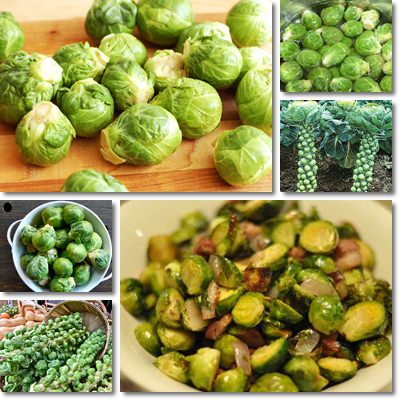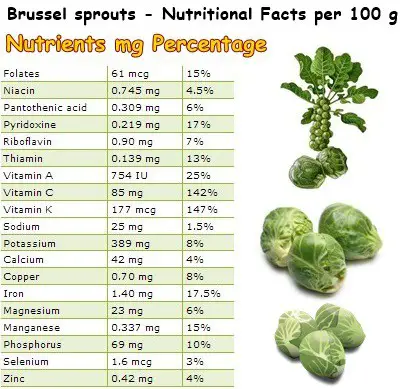Miniature versions of green cabbage, Brussels sprouts (Brassica oleracea) are tiny green leafy vegetables dating back to ancient times. Brussels sprouts are said to owe their name to the Belgian city of Brussels, where they first gained popularity.
Nowadays, this bud-vegetable has become quite popular, with numerous studies asserting its beneficial effects on human health and tracing these benefits back to its good nutritional profile and naturally occurring sulfur compounds with anticancer potential.
Brussels sprouts are an incredible source of vitamins C and K, two nutrients with outstanding antimicrobial, anti-inflammatory as well as antioxidant properties.
The two vitamins are particularly healthy for the cardiovascular, circulatory and immune system. Brussels sprouts are also a good source of vitamin A and folic acid and thus great for preventing eye-related health problems and spine and brain defects in newborns.
Lastly, iron and phosphorus help prevent anemia and low energy levels and support bone health. As stated above, Brussels sprouts belong to the cabbage family (Brassica oleracea) and, as such, are related to white, green and red cabbage, cauliflower, broccoli and kale, some of the most nutritious greens you can put on your plate.

What do Brussels sprouts look like?
Most people know that Brussels sprouts look a lot like miniature round green cabbages. But here is where things get interesting: Brussels sprouts actually grow attached to a thick, dark green stem growing upwards like a pole which has a sort of loosely-wrapped green cabbage on top, very similar to a vegetable-flower. The actual Brussels sprouts grow on the stem and look as if they are glued to it. From a distance, the entire plant resembles a sort of unripe palm tree.
What do Brussels sprouts taste like?
Brussels sprouts taste good, just not like sweet like carrots or potatoes, but rather like bitter leafy greens. Despite their bad reputation, they are quite similar in taste to cabbage and a few other Brassica oleracea members, just slightly bitter. Because taste perception may differ greatly between different individuals, some may find them more bitter than others, but still palatable (in their own bitter way). Also see the benefits of cabbage.
Preserving some of their texture during cooking and adding a favorite spice to flavor these tiny cabbages may help improve taste.
Roast them with a bit of salt and pepper and add a drizzle of olive oil and you have a delicious side dish to your baked chicken. I also love to boil or steam them for 10 minutes or so, then enjoy them with a plain yogurt or sour cream dressing.
Because they boast a relatively generous vitamin and mineral content, Brussels sprouts are a valuable addition to any diet, especially during winter when the choice of fresh fruit and vegetables is poorer in many countries. See below the 6 reasons why Brussels sprouts are good for you.

What are the benefits of Brussels sprouts?
Low in fat and calories, good source of fiber
100 g of raw Brussels sprouts contains 0.3% fat, only 43 kcal (kilocalories) and 3.8 g of dietary fiber. This makes them ideal if you are trying to either lose weight or keep a steady weight, provided you substitute, let’s say, one serving of something creamy or fried with a generous portion of Brussels sprouts. Because just adding more calories, even in the form of veggies, isn’t productive. The good fiber content not only aids digestion, but also helps relieve constipation by adding bulk to stools which, stimulating intestinal transit and encouraging more frequent and regular bowel movements.
Good for cardiovascular health
The fiber in Brussels sprouts prevents the intestines from absorbing all the fat from the foods you eat and thus indirectly contributes to lowering blood cholesterol levels. Moreover, having such a high content of vitamin C, Brussels sprouts have a protective antioxidant effect on the arteries, further contributing to cardiovascular health by preventing fat oxidation (known as lipid peroxidation).

Rich in vitamins C and K
Vitamin C acts as a powerful antimicrobial, supports and stimulates the immune system response. Having enough vitamin C in your diet helps prevent scurvy, bad teeth, gum disease, skin problems (wrinkles) and recurrent ear and respiratory tract infections.
Vitamin K supports blood coagulation processes (it prevents bleeding following surgery, birth, etc.), prevents arterial calcification (when calcium deposits on artery walls, heart valves causing atherosclerosis and stroke), helps maintain bone health and limits nerve cell damage in Alzheimer’s patients. However, if you have been prescribed anticoagulants, it might be best to ask your doctor how much leafy greens rich in vitamin K you can eat (because vitamin K encourage blood to clot). Both vitamin C and vitamin K are known natural antioxidants and anti-inflammatory agents, reducing inflammation markers associated with chronic disease (cancer, diabetes, hear disease).
Good source of vitamin A
Brussels sprouts are a good source of vitamin A, as well as antioxidants with pro-vitamin A activity, notably beta-carotene, lutein and zeaxanthin. This makes them excellent promoters of good vision. Lutein and zeaxanthin are physical constituents of our retina so having them in our diet is imperative if we want to prevent loss of central vision (or macular degeneration) as a result of growing older.
Good source of B vitamins and minerals
Brussels sprouts contain good amounts of B vitamins, notably B1, B6 and B9, known for supporting healthy vision, carbohydrate synthesis, improving brain function and digestion and ensuring the proper development of babies in the womb. Iron stimulates red blood cell production, prevents anemia and improves energy levels. Manganese exhibits a powerful antioxidant activity while phosphorus maintains hormonal balance and supports bone formation.
Anticancer activity
Research on the anticancer properties of Brussels sprouts has revealed the fact that these tiny cabbage look-a-likes are rich in phytochemicals such as thiocyanate, isothiocyanates, sinigrin, indole and sulforaphane which are said to offer considerable protection against colon and prostate cancer by inhibiting carcinogens.
If you can get past the bad taste with bitter, cabbage-like flavors and the relatively minor side effects it causes, notably digestive upset with symptoms such as bloating, burping, cramps and flatulence, Brussels sprouts is a healthy food to consider adding to your diet in moderation.
Conclusion
Overall Brussels sprouts boast a good nutritional profile, being especially rich in vitamins C and K, two powerful anti-inflammatory and antioxidant agents. Ongoing research greatly encourages regular consumption, labeling the vegetable as a must-eat. So what do you say: are Brussels sprouts benefits worth the taste? If so, what is your secret to making them taste better?
